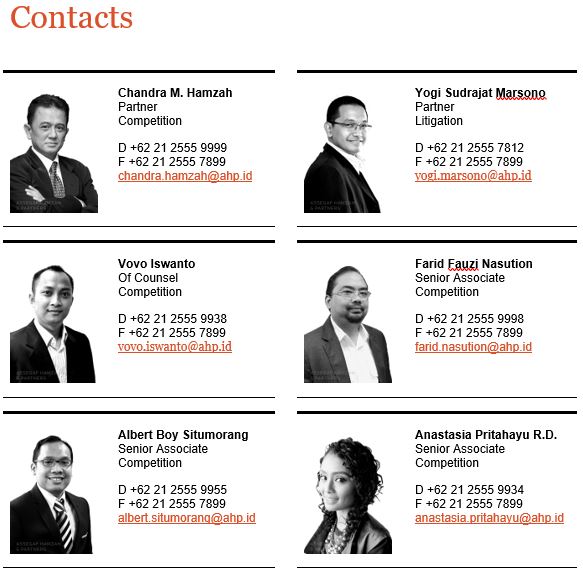The New Public Procurement Rules: More Details Still to Come
On 22 March 2018, the Government of the Republic of Indonesia issued the new public procurement rules, i.e., Presidential Regulation No. 16 of 2018 on the Public Procurement of Goods and Services (“Regulation 16/2018“) and replaced the previous rules under Presidential Regulation No. 54 of 2010 on the Government Procurement of Goods and Services, which was amended several times, most recently through Presidential Regulation No. 4 of 2015 (“Regulation 54/2010“). Regulation 16/2018 regulates the procurement of goods/services by government agencies (i.e. Ministries/Institutions/Regional Government Agencies) that are wholly or partially financed through the state/regional budget, including the procurement of goods/services that are wholly or partially financed by domestic or offshore loans or grants that are received by the government/ministries
Regulation 16/2018 will come into effect on 1 July 2018, so before that, Regulation 54/2010 continues to apply.
Regulation 16/2018 tries to simplify the procurement rules by putting details of the procurement procedures as much as possible in the implementing regulations, e.g., the Head of Public Procurement of Goods/Services Agency (Lembaga Kebijakan Pengadaan Barang/Jasa Pemerintah – “LKPP“) Regulation. The Head of LKPP Regulation is easier to amend and, therefore, it is expected to change more easily with developments in business practice. The downside of moving the procedures to the implementing regulations, however, is that we currently do not know how the new rules will be applied in practice until the implementing regulations are issued.
There are many interesting new features in the new procurement rules, but their details are not known yet. For example, actions are exempted from the public procurement rules if the procurement is carried out in accordance with established business practices. Only after the implementing regulation is issued we will know what is meant by “established business practices.”
Among all the revisions to the procurement rules, we set out below a few items that may be most interesting for businesses. Businesses should consider waiting for the issuance of the implementing regulations prior to undertaking the actions below.
| Provision | Regulation 54/2010 | Regulation 16/2018 |
|---|---|---|
| Limitations on direct procurement of consultation services | Consultation services up to IDR 50 million. (see Article 45 paragraph (1)). | Consultation services up to IDR 100 million. (see Article 41 para (3)). |
| Emergency procurement | Not specifically mentioned. | Emergency procurement can be carried out for emergency circumstances, i.e., natural disasters, social disasters, etc. (see Article 59). |
| International tenders | International tenders can be open for foreign companies under the following conditions:
|
International tenders can be open for foreign companies under the following conditions:
International tenders can be open below those values if there are no qualified domestic providers. (see Article 63). |
| Integrated works | Not regulated. | Regulation 16/2018 provides that the procurement of goods, construction projects, consultation services, and non-consultation services can be conducted in an integrated manner. (see Article 3 paragraph (2)). |
| Procurement consolidation | Not regulated | Procurement consolidation is a procurement strategy to consolidate/merge several packages of similar procurements at the following stages: procurement planning, procurement preparation through providers, and/or preparation for providers selection. (see Article 1 paragraph (51) and Article 21). |
| Repeat orders | Not possible. | Regulation 16/2018 allows direct appointment by way of repeating order from the same Consultant Services Provider. This direct appointment is limited to two times. (see Article 41 paragraph (5d) and (6)). |
| E-reverse auctions | Not regulated. | Regulation 16/2018 regulates that an e-reverse auction may now be implemented for bid offering to select providers. (see Article 50 paragraph (11)). |
| Exemption of certain procurements from the Regulation 54/2010 | Not regulated. | Regulation 16/2018 explicitly excludes the following type of procurements:
(see Article 61). |
| Research | Falls under procurement of consultation services. | Research can be carried out by individuals or a group of individuals of civil servant/non-civil servants, the relevant government institutions, universities, mass organizations, or business actors. Research is decided upon competition or assignment. (see Article 1 paragraph (34) and Article 62). |
| Procurement using e-marketplace | Limited to e-auction and e-purchasing (e-catalogue). | E-marketplace consists of e-catalogue, online shops, and providers selection. (see Article 1 paragraph (20) and Article 70) |
| Dispute-resolution mechanism | Not possible. | Regulation 16/2018 allows LKPP to act as a settlement body for contractual disputes between the tenderers and the providers (see Article 85) |
We will keep you updated on this matter.


***
AHP Client Alert is a publication of Assegaf Hamzah & Partners. It brings an overview of selected Indonesian laws and regulations to the attention of clients but is not intended to be viewed or relied upon as legal advice. Clients should seek advice of qualified Indonesian legal practitioners with respect to the precise effect of the laws and regulations referred to in AHP Client Alert. Whilst care has been taken in the preparation of AHP Client Alert, no warranty is given as to the accuracy of the information it contains and no liability is accepted for any statement, opinion, error or omission.

